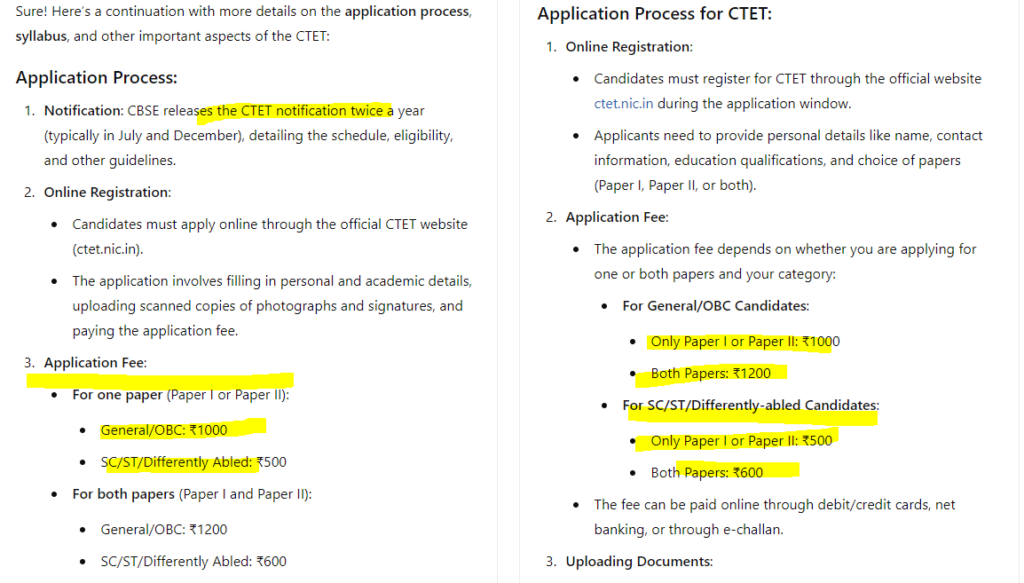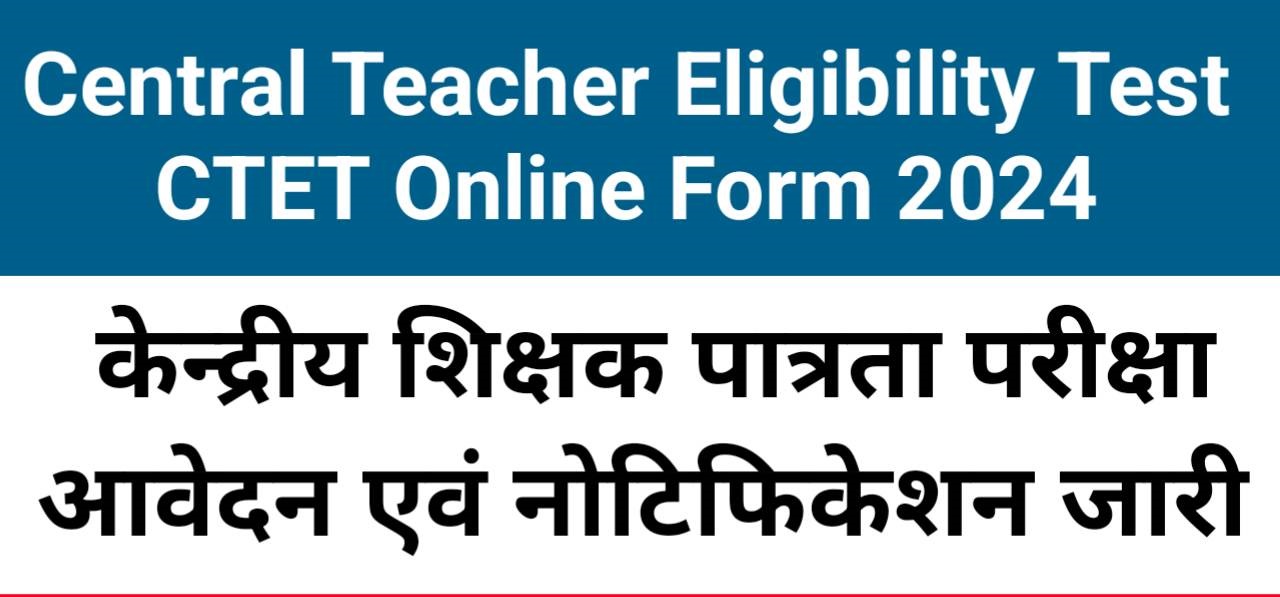December 2024 Primary and Junior Level Exam Apply Online for Paper I & Paper II
The Central Teacher Eligibility Test (CTET) is a national-level exam in India, conducted by the Central Board of Secondary Education (CBSE). It is designed to assess the eligibility of candidates for appointment as teachers for Classes I to VIII in government schools such as Kendriya Vidyalayas (KVs), Navodaya Vidyalayas (NVs), and other central government schools.
Key Highlights of CTET:
- Exam Levels:
- Paper I: For candidates who wish to teach Classes I to V (Primary Level).
- Paper II: For candidates who wish to teach Classes VI to VIII (Upper Primary Level).
- Candidates can appear for both papers if they are interested in teaching from Classes I to VIII.
- Eligibility:
- For Paper I (Primary Level): Candidates need a Senior Secondary (or equivalent) with at least 50% marks and a 2-year Diploma in Elementary Education or equivalent.
- For Paper II (Upper Primary Level): Candidates should have a Graduation degree and a 2-year Diploma in Elementary Education, or a 4-year Bachelor of Elementary Education (B.El.Ed), or other relevant qualifications.
- Exam Pattern:
- The exam is conducted in an Offline Mode (Pen-Paper based).
- Duration: 2.5 hours for each paper.
- Each paper contains 150 multiple-choice questions (MCQs), each carrying 1 mark.
- There is no negative marking for wrong answers. Subjects for Paper I:
- Child Development and Pedagogy
- Language I (usually regional)
- Language II (typically English or Hindi)
- Mathematics
- Environmental Studies Subjects for Paper II:
- Child Development and Pedagogy
- Language I
- Language II
- Mathematics and Science (for Math and Science Teachers) or Social Studies (for Social Studies Teachers)
- Qualifying Marks:
- General category candidates must secure 60% or more to qualify.
- For SC/ST/OBC and differently-abled candidates, 55% or more is required.
- Validity of CTET Certificate:
- The CTET certificate is now valid for a lifetime (earlier it was valid for 7 years).
- Importance:
- Qualifying in CTET is mandatory for appointment as a teacher in central government schools and many state schools.
Do you need more information on the application process or the syllabus?
Sure! Here’s a continuation with more details on the application process, syllabus, and other important aspects of the CTET:
Application Process:
- Notification: CBSE releases the CTET notification twice a year (typically in July and December), detailing the schedule, eligibility, and other guidelines.
- Online Registration:
- Candidates must apply online through the official CTET website (ctet.nic.in).
- The application involves filling in personal and academic details, uploading scanned copies of photographs and signatures, and paying the application fee.
- Application Fee:
- For one paper (Paper I or Paper II):
- General/OBC: ₹1000
- SC/ST/Differently Abled: ₹500
- For both papers (Paper I and Paper II):
- General/OBC: ₹1200
- SC/ST/Differently Abled: ₹600
- For one paper (Paper I or Paper II):
- Admit Card: After the successful submission of the application, candidates can download their admit cards from the official website. It includes exam details like the venue, time, and roll number.
- Exam Centers: The exam is conducted across various cities in India, and candidates are allotted centers based on their preferences during registration.
- Result Declaration: The results are usually declared within 6 weeks of the exam. Candidates can check their results on the CTET website by entering their roll number.
- CTET Certificate: After qualifying for the exam, candidates are issued a digital certificate and mark sheet, which they can download through the Digilocker app. This digital certificate is essential for future teacher recruitment processes.
CTET Syllabus Breakdown:
Here’s a more detailed look into the syllabus for both Paper I and Paper II.
Paper I (Primary Level – Classes I to V):
- Child Development and Pedagogy (30 Marks):
- Understanding Child Development (Primary level children)
- Concept of Inclusive Education
- Learning and Pedagogy theories (Piaget, Vygotsky, Kohlberg, etc.)
- Language I (30 Marks):
- Focus on communication and comprehension abilities.
- Pedagogical understanding of language development.
- Language II (30 Marks):
- Focus on proficiency in language II and comprehension.
- Teaching methodologies related to language.
- Mathematics (30 Marks):
- Topics like Numbers, Shapes, Geometry, Data Handling, Measurement, and Patterns.
- Focus on applying mathematical knowledge to real-life situations.
- Pedagogical concepts for teaching Mathematics.
- Environmental Studies (30 Marks):
- Content related to Family, Food, Shelter, Water, Travel, and Things We Make and Do.
- Pedagogy of Environmental Studies, including concept mapping and projects.
Paper II (Upper Primary Level – Classes VI to VIII):
- Child Development and Pedagogy (30 Marks):
- Focus on child development during the upper primary stage.
- Inclusive education and classroom diversity.
- Learning and Pedagogy.
- Language I (30 Marks):
- Comprehension passages, grammar, and language development.
- Pedagogical issues related to Language I.
- Language II (30 Marks):
- Focuses on communication skills and comprehension in the second language.
- Teaching methodology and language pedagogy.
- Mathematics and Science (60 Marks):
- Mathematics: Algebra, Geometry, Mensuration, Data Handling, Number System, and Pedagogical approaches for teaching Mathematics.
- Science: Food, Materials, The World of the Living, Natural Phenomena, and Pedagogical Issues.
- History, Geography, Social and Political Life, and Economics.
- Pedagogical issues in Social Science education, including teaching methodologies and project-based learning.
Preparation Tips:
- Understanding the Syllabus: Go through the detailed syllabus and focus on high-weightage topics. Both papers require a clear understanding of pedagogical concepts.
- Time Management: Practice solving previous year’s papers and mock tests to manage time during the actual exam effectively.
- Conceptual Clarity: Since many questions are application-based, understanding concepts clearly (especially in Child Development and Pedagogy) is crucial.
- Regular Revision: Since the exam has no negative marking, aim for accuracy and speed. Consistent revision of key topics helps in retaining information.
- Pedagogy Focus: A significant portion of the exam revolves around pedagogy, so focus on learning different teaching techniques, classroom management strategies, and learning theories.
Career Prospects after CTET:
- Teaching in Central Government Schools: A valid CTET certificate qualifies candidates to apply for teaching positions in Kendriya Vidyalayas (KVs), Navodaya Vidyalayas (NVs), Tibetan Schools, and other central government-run institutions.
- State Government Schools: Many state governments have adopted the CTET pattern, and candidates with CTET certification are given preference in state-run school recruitment.
- Private Schools: Many private schools across India also prefer candidates with CTET certification as it demonstrates a minimum level of competence required for teaching.
- Other Teaching Exams: CTET certification enhances your profile if you want to appear for other competitive teaching exams like TETs conducted by state governments, DSSSB, or Army Public Schools’ recruitment exams.
CTET is a gateway to a stable and rewarding career in teaching, especially in government institutions. It ensures that candidates meet the required teaching standards and are capable of delivering quality education at the foundational levels.
Do you need help with preparation strategies, books to refer to, or mock tests for the exam?


